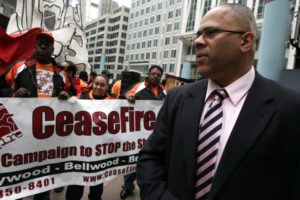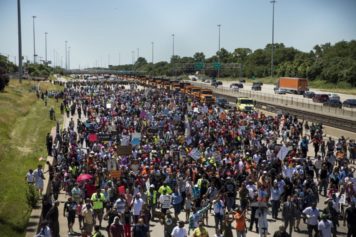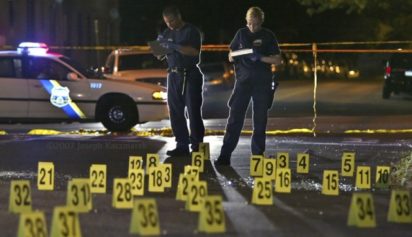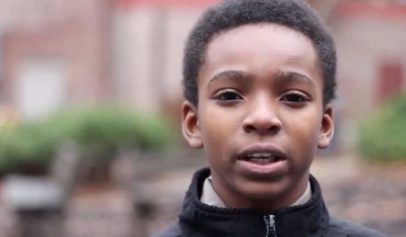
According to the Chicago Tribune, there were 762 homicides recorded by the Chicago Police Department last year and over 4,300 wounded. The Trace has noted that while Chicago has the highest number of gun shootings and homicides overall, more than a dozen cities have a higher per capita rate. While people in everyday public discourse regard such violence as an infectious disease, the medical community has provided the research to support that rhetorical assertion. A new study published in JAMA Internal Medicine has found that gun violence spreads through networks of people, transmitted like a disease through social interaction. In fact, this is known as a “social contagion,” with those who are impacted by gun violence spreading it to those around them. The study identified and analyzed a network of 138,163 people in Chicago and determined that 63.1 percent of the 11,123 incidents of gun violence episodes that took place between 2006 and 2014 were due to social contagion.
Responding to these circumstances, there are efforts in Chicago to deal with the problem of gun violence not merely through punishment, but rather through a holistic approach that considers the circumstances in which people find themselves. For example, the YMCA of Metro Chicago has developed a Youth Safety and Violence Prevention program that cultivates leadership among at-risk young people and takes a trauma-informed approach to violence prevention. Specifically, the Y understands that “chronic exposure to traumatic stress places thousands of Chicago area youth at risk of anxiety, depression, low self-esteem, sleep disturbance and somatization,” according to their website. If left untreated, such symptoms can often lead to negative coping behaviors and mechanisms that are all too familiar, such as incarceration, an early death, bullying, drug use, gangs, academic failure and harming oneself.
Working with children who are at the highest risk for being both victims and perpetrators of violence, the YMCA has several programs that provide a “Circle of Care” by cultivating relationships of trust among youths and their mentors, staff and community experts. The goal is to reduce the adverse experiences children face, channel that negativity into helping their community, build their resiliency and help them lead productive lives. One of their initiatives, the Urban Warriors mentoring program, matches young people from Chicago’s neighborhoods with post-9/11 military veterans.
“Kids identify themselves as soldiers because they live in war-zone communities,” Eddie Bocanegra, co-executive director of the Youth Safety and Violence Prevention programs told NPR. A former gang member who was caught up in the system, Bocanegra now devotes his life to stopping the violence in Chicago in a journey that led him to a B.A. degree in social work at Northeastern University and an M.A. from the University of Chicago. “They make the parallels between, veterans, you know, carry guns, we carry guns,” he said. “They got ranks, we got ranks. They got their Army uniforms, we got our gang colors. And the list went on and on.”
Gun violence is a public health issue and some medical professionals are studying the root causes of gun violence and want to take a holistic approach to addressing it. Recently, more than 90 people from two dozen organizations joined the Chicago Gun Violence Research Collaborative (CGVRC). Formed by Sinai Urban Health Institute and the Illinois Public Health Institute, CGVRC unites community experts and academic researchers to understand the root causes of crime and craft evidence-based solutions to the city’s violence epidemic. According to CGVRC, the group will share research, seek input from the community and develop and provide data to those who are working to prevent and reduce gun violence in Chicago.
“We see the ravages of gun violence every single day in our trauma center and emergency rooms, and we will not sit idly by while grave injuries and homicides continue to escalate and devastate our city,” Karen Teitelbaum, president and CEO of Sinai Health System, said in a statement. “We have to be attentive to the unique problems in the communities.” Sharon Homan, president of Sinai Health Urban Health Institute told
Sharon Homan, president of Sinai Health Urban Health Institute, told WTTW. “All of the communities that are suffering from gun violence are facing economic challenges, inequities in job opportunities, poverty and crime.” Homan noted that each community has an array of problems that will require a multifaceted approach from the criminal justice system, schools and neighborhoods.
Another program that has shown impressive results in violence prevention in New York has seen its funding slashed in Chicago by the Illinois legislature. As The Trace reported, CURE Violence, a neighborhood-level violence intervention program, has been credited with easing gang tensions and slowing fatal shootings. Under the program, outreach workers who are independent of law enforcement develop “wraparound” strategies to help people steer away from violent lifestyles. This includes directing individuals toward legal and mental health services, providing job training and communicating with local schools. These workers also provide support to youthful offenders who come out of juvenile detention and assist them in making good decisions so they do not find themselves back in a life of violence. In New York, CURE Violence has led to the near-total elimination of gun violence in the Queensbridge Houses, the largest public housing development in the U.S.
Finally, the Cook County Court has established a pilot program known as the “Restorative Justice Community Court.” In order to be eligible for the court, the defendant must be between 18 and 26 years old and charged with a nonviolent felony or misdemeanor, as WBBM reported. Under the program, the defendant would sit down with his or her victims and other members of the community to discuss what drove the offender to commit the wrongdoing (reasons could include drug abuse, mental health challenges, etc.) and discuss what would satisfy the victim. What makes this court different from many others is a local community partner would provide services and mentoring to the person who committed the crime.
If Chicago is to address the gun violence in its midst, solutions will not come from the failed methods of punishment and criminalization. Rather, the community must be involved in solutions that take into account the needs and challenges they face and serve to build people up rather than tear them down.


